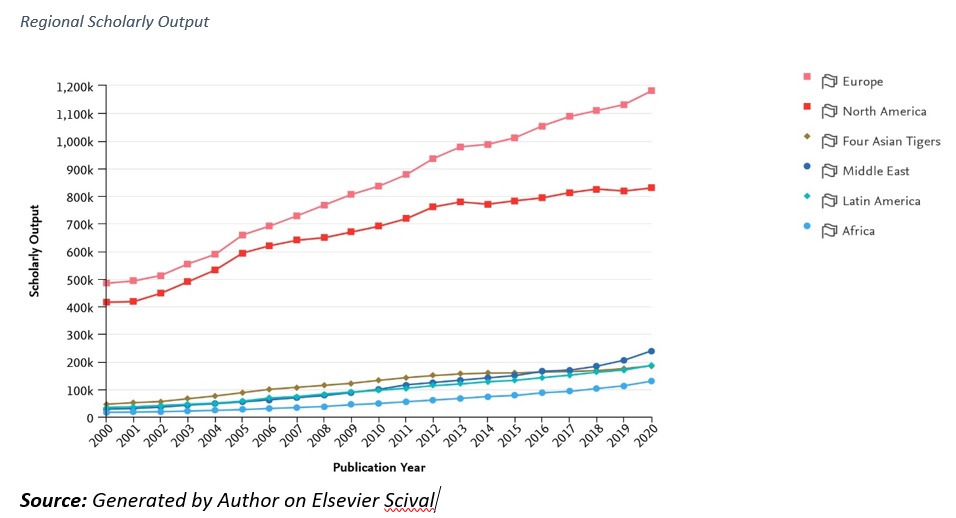
Over the last two decades, Africa’s research output has grown eight folds. Between the years, 2000 and 2020, African research output as a percentage to world research output grew by almost 200 percent. For the decade 2010 to 2020, this growth is estimated at approximately 87.11 percent.
As promising as this sound, the continent accounts for meagre 3.6% of global research output according to data from the Elsevier’s Scival tool, which tracks research production and performance for over 8500 research institutions and 220 nations worldwide. It is possible that more research work has been or currently being carried out on the continent. However, African research is hard to find. Oftentimes it is overly focused on local or regional topics, remains in unpublished forms or published in unindexed journals (Francescon, 2017). Addressing these problems - by publishing unpublished research and indexing unindexed journals - will likely increase the discoverability of research conducted within the continent but it is unlikely to increase, significantly, the continent’s share of global scholarly output in the short term.
Critical in the evidence ecosystem is evidence uptake and or use by the relevant stakeholders, particularly end users and policymakers. The entire process definitely starts with generating evidence, an expensive and time-consuming activity. In resource-scarce settings as in most of Africa, particularly sub-Saharan Africa where evidence generation and capacity is slow and limited, the use of globally generated evidence is unavoidable if policymakers must make timely and informed decisions. In their original formats, however, this global evidence could be misleading even if they address similar local problems. The need therefore for a robust scientific process to adapt, contextualize or fully adopt the evidence recommendations as presented in the research is sacrosanct. Hence, a transferability tool.
The Journey
Over the last 18 months, Effective Basic Services (eBASE) Africa, with funding from the Center of Excellence for Development Impact and Learning (CEDIL), and a partnership with the Education Endowment Foundation (EEF) has contextualized the global teaching and learning toolkit. The global toolkit, which is an accessible summary of a multiplicity of interventions aimed at improving educational attainment, synthesized by way of systematic reviews and meta-analysis, and grouped across 35 main headings, hereby referred as strands was developed by researchers at Durham University, with funding from, and collaboration with the EEF. To contextualize this toolkit, eBASE, through consultations with education stakeholders in Cameroon, Chad, Niger and Nigeria decided upon 31 of the 35 strands deemed relevant to the Lake Chad Basin context. Three (3) extra strands relevant to the African context (Menstrual Hygiene Management, Cash Transfers, and Maltreatment Prevention) were also included. Researchers at eBASE then developed a search strategy for all 31 strands and systematically searched over nine databases and gateways for locally conducted and relevant studies. Following screening by title and abstract and full texts, rapid reviews or evidence summaries were then written, summarizing the research evidence for the sub-Saharan African Region. The collection of these evidence summaries, constitute the eBASE teaching and learning toolkit. In addition to these 31 strands, eBASE, in collaboration with Durham University researchers has published protocols and is conducting systematic reviews for three additional strands – Menstrual Hygiene Management, Maltreatment Prevention, and Cash Transfers. These resources are available in a bilingual (French and English) format.
On the sidelines of this re-contextualization exercise, was data extraction from the global toolkit across several variables including cost, local relevance, complexity, effect size, and through stakeholder engagement, a determination of intervention transferability of the various interventions. From 35 strands, the fast-tracked process enabled data extraction for a total of 310 interventions. The data cleaning process led to the isolation of missing entries, hence reducing the lot used for analysis to 228 observations. A predictive model is then deployed using the Classification And Regression Tree (CART) algorithm with transferability as the outcome variable. Based on preliminary results, intervention relevance, complexity, and cost of implementation are key variables policymakers should consider when faced with an option to implement or use externally generated evidence to solve local issues.
The results are however, prototypical. An expanded database, coupled with more stakeholder sessions to diligently unpack the variables is likely to provide more information for the model to learn, thereby increasing its efficiency at predicting transferable interventions. Hence, a potent tool for African policymakers and evidence users to bypass the lag involved with generating new evidence and fast-track decision making.
The views expressed in published blog posts, as well as any errors or omissions, are the sole responsibility of the author/s and do not represent the views of the Africa Evidence Network, its secretariat, advisory or reference groups, or its funders; nor does it imply endorsement by the afore-mentioned parties.